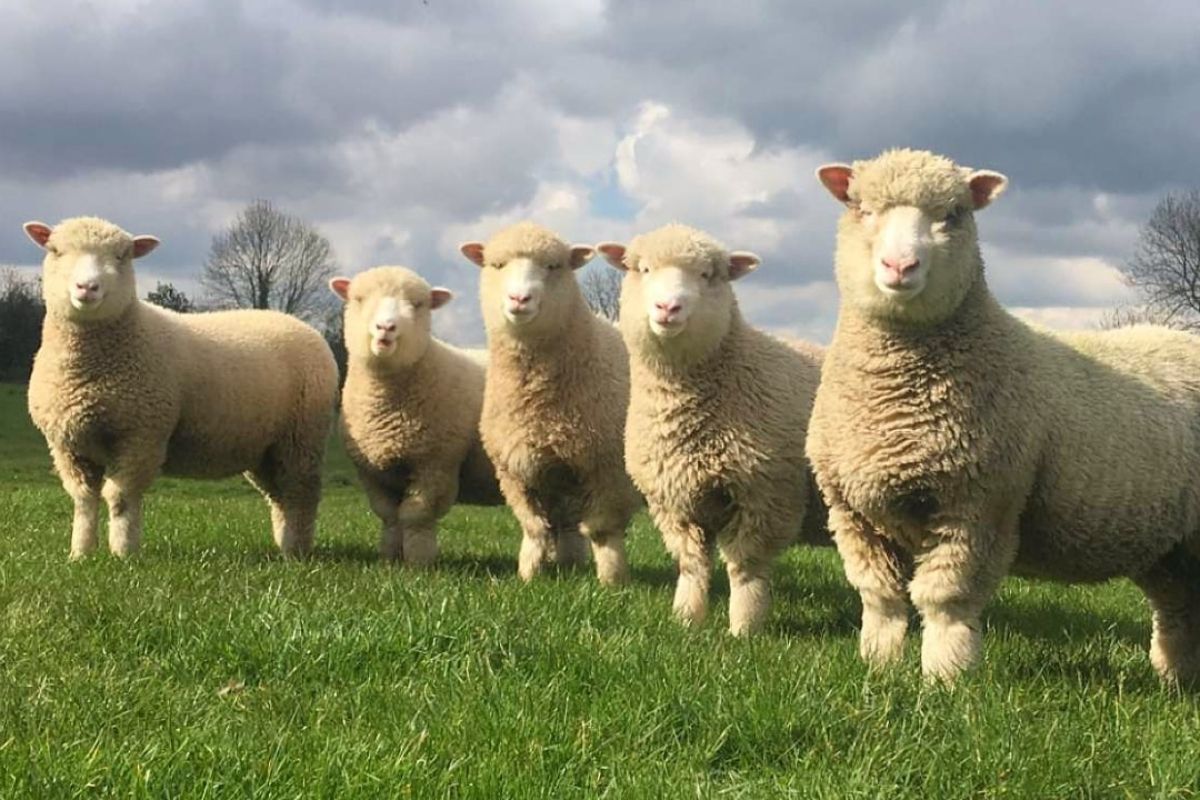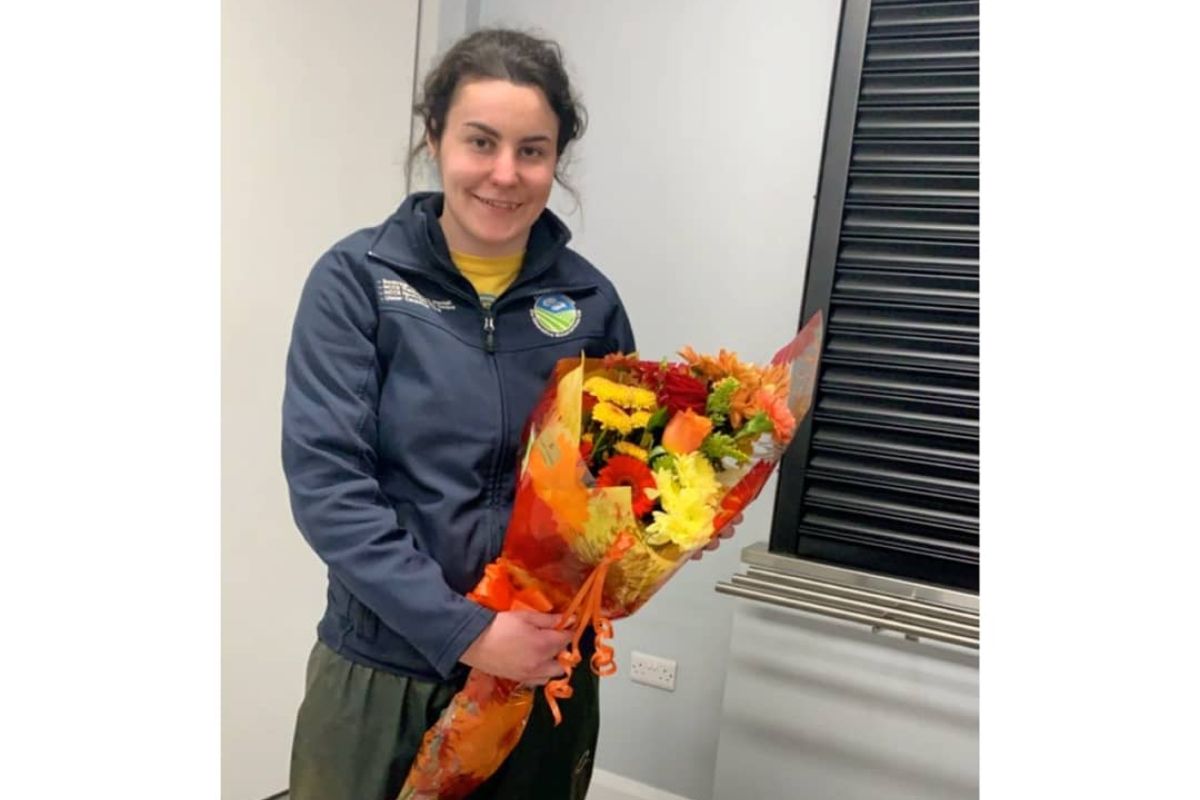In this week’s Women in Ag segment, That’s Farming, speaks to Cathy Holmes, a farmer and engineer from Northern Ireland.
As an engineer and farmer, 24-year-old Cathy Holmes is making waves in two traditionally male-dominated fields.
The Maghera, County Derry, Northern Ireland native, has just vacated her part-time position as an auctioneer’s clerk at Swatragh Livestock Market, following a ten-year stint.
She works for a leading poultry firm in Ireland since November 2020, following her virtual graduation from Queen’s University and farms on a part-time basis.
“My earliest farming memories involve sailing in a tractor and my head over a byre door watching cows calve. But what sparked my interest in sheep was working at a livestock market when I was 14,” he told That’s Farming.
“My grandfather, Jackson, took over the farm when he was 16 and can be still found behind the tractor’s wheel. My aunt, Sandra, is also home full-time and is responsible for the breeding, care, and management of the cattle. The sheep are purely owned and looked after by my younger sister, Claire, and I.”
“Working full-time, my farming responsibilities are restricted to the evenings and weekends. At the weekends, my aunt works out, so I am responsible for the care of all stock, including milking. At the weekends, I also like to catch up on any jobs such as dosing or foot-bathing sheep.”

Dairy, beef, and sheep farming
The farm is home to a 40-strong British Friesian dairy herd, with Angus calves finished and sent directly to the factory. The farm also comprises a flock of 15 pedigree Dorset ewes.
On the sheep front, lambing occurs in September, with a Dorset ram introduced to ewes the second week of April. On the other hand, ewe lambs lamb down in December at 15 months.
“We lamb in September when the weather is generally still good, so we do not have to house ewes. I like to bring springers in one-week pre-lambing so I can keep an eye during the day via a CCTV camera in the shed.”
“Dorsets can lamb all year round, an attribute unique to the breed, meaning a farmer can choose a lambing time to best suit any system. Lambing out of season works well for us because it reduces the demand for better grass swards in the spring/summer months, meaning these can be kept for the cattle.”
“Autumn lambing also means stronger lambs will be available for sales, and any lambs sold for meat will be ready during peak trade. As well as having the ability to lamb all year round, Dorsets can be incorporated into a frequent lambing system of three crops in two years, resulting in typical annual averages of 250%.”
Cathy registers all ewe lambs and sells these as replacements, while she sells the pick of the ram lambs as breeding tups to pedigree or commercial flocks and others as spring lambs.
“Demand for the breed has taken off in recent years, with the number of new breeders increasing year on year.
She said this was evident at the recent Diamond Sale held in March at Ballymena Mart, Northern Ireland, with ram lambs topping at 6,600gns, setting a new breed record.

Highs and lows of farming life
“I enjoy coming home from work and getting out to see the stock, particularly on a warm summers evening. Also, with the pedigrees, I enjoy trying out new bloodlines and seeing how this alters traits in their progeny.”
“The winter is challenging because I’m leaving for work in the dark and coming home in the dark, so it is hard to check ewes and lambs properly. Claire, however, tends to do the feed checks this time of year which is a big help,” added the Dorset Sheep Society and Curragh YFC member.
Cathy’s biggest achievement so far was winning best new entrant in the 2019 NI Dorset Sheep Society flock competition, as well as third place in the small flock category in 2019 and second place in the small flock 2020 section.
“As a youngster, I showed horses both in hand and ridden. I hope to get back into the show ring with the sheep, but Covid-19 prevented this last season. I, however, hope to when we return to normality.”
“My boyfriend, Adam, breeds pedigree Aberdeen Angus cattle and prepares others’ cattle for shows and sales. I am looking forward to trying my hand at the cattle showing too.”

Farmer and engineer
Through her work with a leading NI poultry firm, employing over 12,000 people across its sites, she has combined her two passions, engineering, and agriculture.
As a project engineer, she must cost and manage capital and revenue projects for the site. This often involves planning, organising, and controlling providers of external engineering support where the skills do not exist internally.
She moved to fill the position after studying a Masters (Meng) in Chemical Engineering at Queen’s University Belfast.
“Maths and science were always my strongest subjects at school, so a career in engineering was always a possibility. Chemical engineering is the branch of engineering concerned with the design, construction, and operation of machines and plants that perform chemical reactions to solve practical problems or make useful products.”
“In lay man’s terms, the science and engineering required to convert one thing to another. A diverse range of sectors, energy production, pharmaceuticals, water industry, chemical products and food production, require this engineering route, but I was always keen to find a job with an agricultural link.”

Women in engineering
According to Cathy, problem-solving and time management are the key crossover skills between engineering and farming. She stressed that you must think on your feet and use whatever resources you have available to fix problems.
“Currently in NI, just 12% of engineering professionals are women. I am not surprised by this as going through school, the number of girls in my classes dramatically reduced, with many diverging away from STEM subjects.”
“Likewise, at university, engineering classes had a significantly higher percentage of men. The lack of women in the sector was never a consideration for me. I am glad to see the numbers enrolled in engineering degrees increase year-on-year.”
She always enjoyed leading projects at university, so she quickly decided to go down the project management route rather than the typical process engineering route.
Securing her dream job in a pandemic
Cathy enjoys that projects are “so varied” in her new role, from introducing new processing equipment in the factory to civil engineering projects in the yard.
“The main challenge for me is nothing to do with gender but more so lack of experience. I am fresh out of university and in a new job on a busy site. Nonetheless, I am quickly finding my feet and gaining confidence with the help of my colleagues.”
“As a female, I have never had an issue of being treated unfairly because of my gender. I think you should always be judged based on your ability and the quality of the stock you present.”
“I have achieved my master’s degree and no longer wish to further my education. However, I was very fortunate to land myself in the exact job I was after as a graduate in a pandemic, and I hope to stay within the company for many years,” the farmer and engineer concluded.





